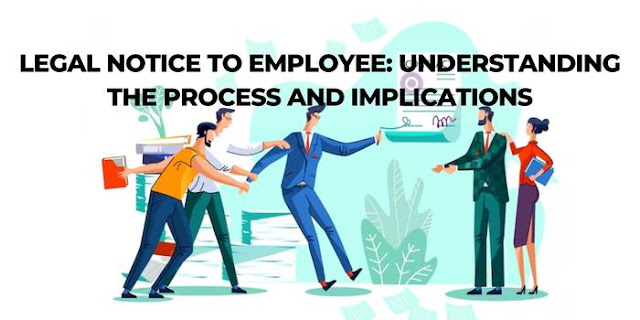Legal Notice To Employee: Understanding The Process And Implications
As an employer, there might be instances where you encounter issues with employees that require a formal resolution. When informal discussions fail to resolve the matter, issuing a legal notice to the employee becomes a necessary step to address the situation within the legal framework. In this blog, we will explore the significance of legal notices to employees, the reasons for their issuance, and the essential considerations in this process.
When Is A Legal Notice To An Employee Issued?
Legal notices to employees are typically issued in the following situations:
Breach of Employment Contract: When an employee violates the terms and conditions specified in their employment contract, a legal notice can be served to address the breach and seek appropriate remedies.
Disciplinary Actions: In cases of serious misconduct or repeated infractions, a legal notice may be sent to initiate disciplinary action or termination proceedings.
Recovery of Dues: If an employee owes money to the company or has not returned company assets, a legal notice may be sent to demand payment or return of the property.
Defamation or Misrepresentation: In situations where an employee makes false allegations against the company or divulges sensitive information, a legal notice can be served to protect the company's reputation and interests.
Drafting The Legal Notice:
Crafting a legal notice requires precision and adherence to legal norms. It is advisable to engage an experienced employment lawyer to draft the notice. The notice should clearly state the facts of the case, the alleged violations, and the remedies sought. Ensuring a well-drafted legal notice enhances its effectiveness and the chances of an amicable resolution.
Serving The Legal Notice:
Serving the legal notice to the employee is a crucial step. The notice can be delivered in person, sent via registered post, or even emailed, depending on the employer's preferred method and the legally acceptable means of communication.
Impact On Employee-Employer Relationship:
Sending a legal notice can significantly impact the employer-employee relationship. In some cases, it might strain the relationship further, leading to potential repercussions such as decreased productivity and workplace unrest. Therefore, it is essential to assess the situation carefully and decide if issuing a legal notice is the most suitable course of action.
Legal Remedies:
After the employee receives the legal notice, they have the opportunity to respond or comply with the demands. Depending on the employee's response and actions, the employer can pursue various legal remedies, including:
Settlement or Mediation: Attempting an out-of-court settlement or mediation to resolve the dispute amicably.
Termination: If the employee fails to address the issues raised in the notice, termination of employment may be considered.
Recovery of Dues: Initiating legal proceedings to recover dues or damages caused by the employee's actions.
Cost Considerations:
Issuing a legal notice to an employee involves costs, including legal fees, documentation charges, and potential court fees if the matter escalates to litigation. Employers should weigh these expenses against the potential benefits of taking legal action.
Conclusion:
A legal notice to an employee is a significant step that employers should approach with careful consideration. It serves as a formal means of addressing workplace issues and can lead to various legal outcomes, depending on the employee's response and actions. Engaging legal professionals to navigate the process ensures that the notice complies with legal requirements and maximizes the chances of a favorable resolution. By understanding the process and implications of issuing a legal notice to an employee, employers can protect their rights, maintain a harmonious work environment, and resolve disputes efficiently within the bounds of the law.
(Note: The information provided in this blog is based on general principles and practices related to legal notices to employees as of September 2021. Specific laws and regulations may vary depending on the jurisdiction and should be verified with legal experts for the most up-to-date guidance.)

.jpg)
